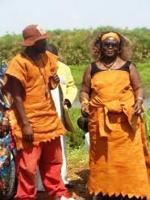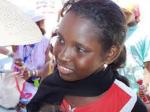What to Carry on a Kenyan Safari
Do you know what to carry while going for your safari to Kenya? This page is giving you full details about what you should buy for your safari in Kenya and Africa in general.
LUGGAGE
Space in the safari vehicle is limited and we request that you pay particular attention to the following guidelines.
Your luggage is restricted to:-
• 1 bag not exceeding 12kgs and 65x46 cm. We recommend that you pack your personal effects in an inexpensive barrel/sausage bag available from discount stores, hypermarkets and sports shops
• + 1 sleeping bag & small pillow (warm sleeping bag or blanket for winter)
• + 1 small handbag (airline type) or daypack containing money, travel documents and camera equipment. This will be allowed inside the vehicle, placed by the passenger's feet
• + 1 waist pouch or money belt
• + 1 small fold-up bag to be used on itineraries that include short excursions. Essential for the Sesriem and Sossusvlei excursions and optional excursions
We recommend that you utilize old or inexpensive luggage. Suitcases are unsuitable for our type of safaris. You may use a small/medium-sized rucksack, provided that it has no frame.
IMPORTANT: TO AVOID LOST LUGGAGE IN TRANSIT:
Please take your sleeping bag, medication and toiletries with you on board the plane. For passengers with connecting flights, please allow sufficient connecting time between flights (usually 2 hours). We suggest you check your luggage to each transfer point airport en route, especially if traveling via Johannesburg, to allow you to identify and collect your luggage and re-check to your final destination.
CLOTHING & PERSONAL EFFECTS (PLEASE TAKE THE MINIMUM):
Most people make the mistake of taking along too much clothing. Take along comfortable, casual and semi-casual, "wash and wear" clothes. Bright colors and white are not suitable for game viewing.
This list below is purely a guideline, and will depend on the duration/length of the safari as well as month/season traveling. Additional warmer clothing may be required during June/July/August:-
• 1-2 pair/s of smart/ casual trousers
• 3-4 pairs of shorts
• 7 Shirts/ T-shirts (any combination)
• 1 light cotton dress/sarong for the ladies
• 1 jersey for the evenings (April to August)
• 1 tracksuit (April to August)
• 1 windbreaker/ rain jacket (December to March)
• 1 warm jacket (May - September: winter nights can be very cold!)
• 1 pair of walking/ running shoes
• 1 pair of sandals/ thongs/ rafting or canoeing shoes
• Underwear and socks
• 1 swimming costume
• 1 sun hat
• 1 towel
CANOEING SAFARIS:
Essential to have a pair of rafting or canoeing shoes. A long sleeved shirt will provide protection from the sun. We also recommend a pair of gloves and a sarong.
Also remember the following:-
• 1 liter water bottle (essential)
• 1 torch + batteries (essential)
• 1 roll toilet paper
• Bath soap, Toothbrush/toothpaste
• Shampoo & hair conditioner
• Deodorant
• Comb/ hair brush, nail brush
• Razor & blades (preferable battery operated shaver)
• Suntan lotion/ Sun block
• Lip balm
• Hand cream & Moisturizing Cream
• Insect repellent
• Tissues or disposable moist tissues (e.g. Wet Ones)
• Washing powder, plug for sink
• Washing line (length of cord) pegs
• Plastic bag (to pack wet/ dirty clothing)
• Sunglasses
• Spectacles (if worn) - some people have trouble with contact lenses & dust
• Pen for immigration formalities
• 1 note book
• Multi-purpose knife (e.g. Swiss army knife)NB: small sports/ kit bag for excursions as mentioned under "Luggage"
You are also welcome to bring along a bottle of your favorite drink liquor.
Personal Medical Kit:
We suggest that you take along the following:-
• Plasters
• Aspirins/ paracetamol
• Anti-diarrhea pills and laxatives (consult your pharmacist for advice)
• Throat lozenges
• Antiseptic cream
• Insect bite cream
• Eye drops
• Anti-malaria tablets (refer MALARIA section)
• Any other medicines & toiletries you regularly use
• Energy bar drink for canoeing safari
• Dehydrate powder/ sachets
Maps and Field Guides:
We recommend the following:-
• Michelin Map No 955 - Africa Central & South, Madagascar
• Robert's Birds of Southern Africa - G L Maclean
• Newman's Birds of Southern Africa - Kenneth Newman
• Field Guide to Mammals of Southern Africa - Chris & Tilde Stuart
• Southern Africa Mammals - Robin Frandsen
Photography:
For photography of birds and animals a 300mm telephoto lens is recommended. Films & batteries are only available in larger cities and tend to be expensive. We recommend that you take along sufficient films and a spare battery for your camera.
Video Cameras:
Many people bring video cameras on safari. The power supply in Kenya is mostly 220-240 volts. It may be possible to recharge the video camera off the battery of the vehicle through a 12 volt cigarette lighter socket. We recommend that you take along enough batteries and recharging equipment with cigarette lighter adapter.
Binoculars:
When visiting wildlife areas it is essential that participants have a pair of binoculars for their personal use, in order to benefit fully from the safari
SHOPPING
There are various outlets in the different cities:
• Nakumatt Stores (24 hour services)
• Uchumi supermarkets
• Tuskys
• Sarit, Capital and Yaya center
• Village market
Other Related Pages
Travelling in Kenya › | Type of Visas in Kenya › | What to Buy in Kenya › | What to see in Kenya › | When to go to Kenya › | Work in Kenya › | Kakamega Town › | Attractions › | Hospitals and Medical Services › | Industries and Factories › | Locations and How to Travel › | People and Culture › | Property and Real Estate › | Schools and Colleges › |Recent Articles
-
Garam Masala Appetizers ,How to Make Garam Masala,Kenya Cuisines
Sep 21, 14 03:38 PM
Garam Masala Appetizers are originally Indian food but of recent, many Kenyans use it. Therefore, on this site, we will guide you on how to make it easily. -
The Details of the Baruuli-Banyara People and their Culture in Uganda
Sep 03, 14 12:32 AM
The Baruuli-Banyala are a people of Central Uganda who generally live near the Nile River-Lake Kyoga basin. -
Guide to Nubi People and their Culture in Kenya and Uganda
Sep 03, 14 12:24 AM
The Nubians consist of seven non-Arab Muslim tribes which originated in the Nubia region, an area between Aswan in southern








New! Comments
Have your say about what you just read! Leave me a comment in the box below.